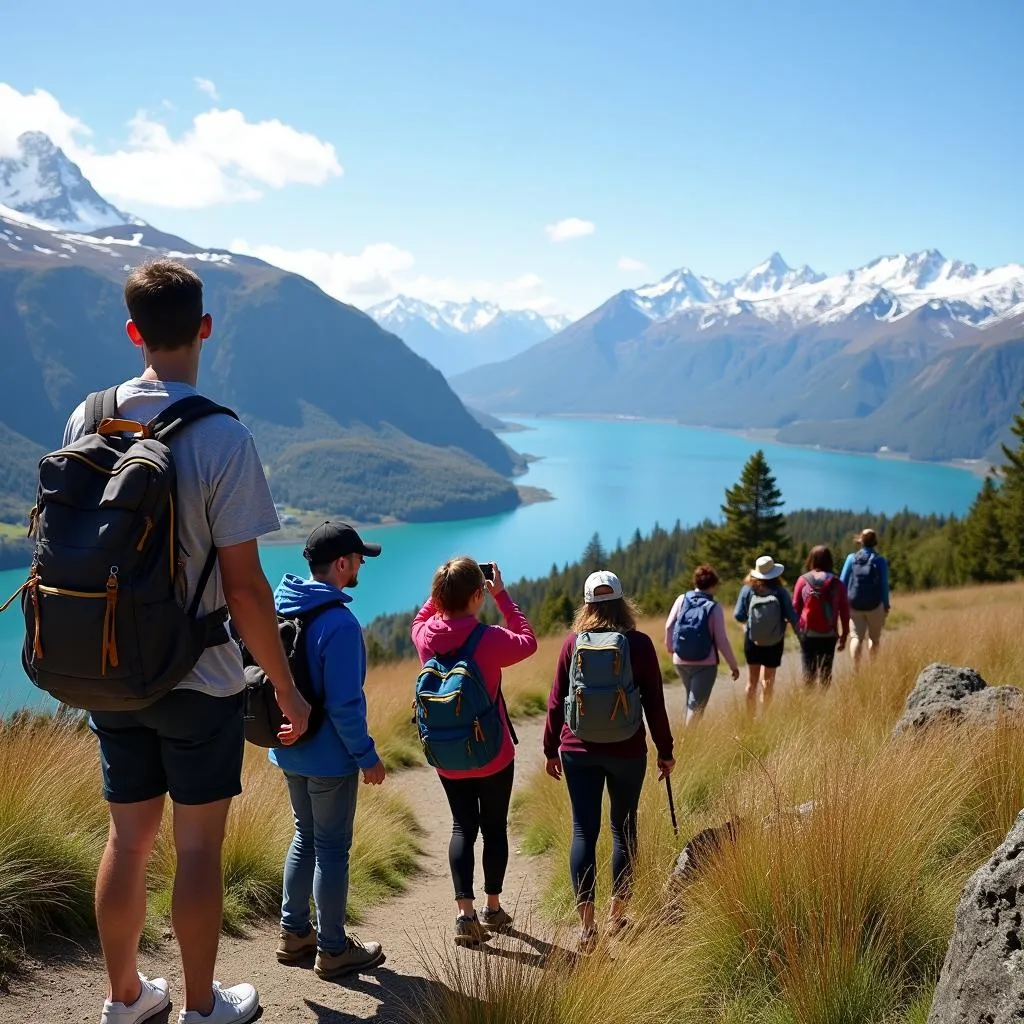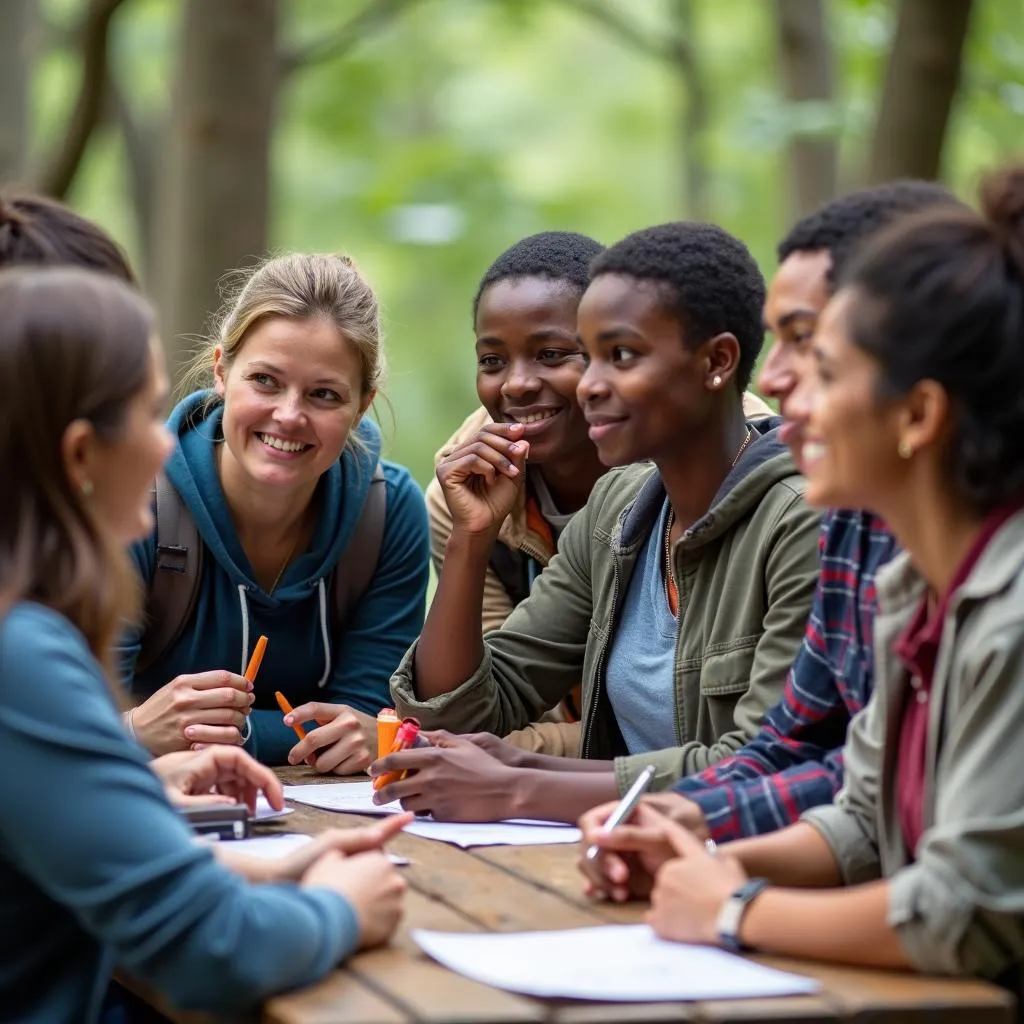Introduction and Interview (Part 1)
In IELTS Speaking Part 1, examiners often ask questions about travel experiences. Here are some common questions related to group travel:
Nội dung bài viết
- Do you prefer traveling alone or with a group?
- What are the advantages of traveling with a group?
- Have you ever had any challenges while traveling with others?
Let’s look at a sample answer for the first question:
Examiner: Do you prefer traveling alone or with a group?
Band 6-7 Answer:
I generally prefer traveling with a group. It’s more fun to share experiences with friends or family. We can split costs and help each other out if there are any problems. However, sometimes I enjoy solo trips for the freedom they offer.
Band 8-9 Answer:
I’d say my preference varies depending on the circumstances. While I thoroughly enjoy the camaraderie and shared experiences that come with group travel, I also relish the autonomy of solo adventures. Group trips are fantastic for fostering bonds and creating lasting memories, especially when exploring new cultures or tackling challenging itineraries. On the other hand, solo travel allows me to immerse myself fully in the destination and pushes me out of my comfort zone, leading to personal growth.
Long Turn (Part 2)
Now, let’s move on to Part 2, where you’ll be given a cue card to speak about for 1-2 minutes. Here’s a sample cue card based on our topic:
Describe a time when you traveled with a group of people
You should say:
- Who you traveled with
- Where you went
- What you did during the trip
- And explain how you felt about traveling with this group
Band 6-7 Answer:
Last summer, I went on a trip with five of my college friends. We decided to visit Da Lat, a beautiful city in the Central Highlands of Vietnam. During our stay, we did many exciting activities. We went sightseeing around the city, visited flower gardens, and tried some local food. One of the highlights was taking a cable car ride to enjoy the panoramic view of the city.
Traveling with this group was really enjoyable. We had a lot of fun together and shared many laughs. It was great to have company while exploring a new place. We helped each other out when needed and made decisions together. However, sometimes it was challenging to agree on what to do because we had different interests.
Overall, I felt happy about the trip. It strengthened our friendship and created many good memories. I think group travel can be very rewarding if you’re with the right people.
Band 8-9 Answer:
Last autumn, I embarked on a memorable expedition with a diverse group of six individuals – a mix of old friends and new acquaintances – to the picturesque landscapes of New Zealand’s South Island. Our itinerary was a perfect blend of adventure and cultural immersion, spanning two exhilarating weeks.
We kicked off our journey in Queenstown, the adventure capital, where we pushed our limits with activities like bungee jumping and white-water rafting. As we traversed the island, we marveled at the breathtaking fjords of Milford Sound, trekked through the pristine wilderness of Abel Tasman National Park, and indulged in wine tasting at the renowned Marlborough vineyards.
One of the most enlightening aspects of the trip was our visit to a Maori village, where we gained profound insights into New Zealand’s indigenous culture. We participated in traditional ceremonies, learned about their customs, and even tried our hand at the haka, the famous Maori war dance.
Reflecting on this group travel experience, I found it immensely fulfilling. The diversity within our group brought a richness to our interactions and perspectives. We complemented each other’s strengths – while some were excellent at navigation, others excelled in photography or culinary exploration. This synergy allowed us to make the most of every moment and experience.
However, it wasn’t without its challenges. Navigating different personalities and preferences required patience and compromise. Yet, these moments of negotiation fostered a deeper understanding among us and honed our interpersonal skills.
Ultimately, this journey transcended mere sightseeing. It became a transformative experience that not only broadened our horizons but also forged lasting bonds. The shared adventures, laughter, and even occasional misadventures created a tapestry of memories that I’ll cherish for years to come. This trip reaffirmed my belief in the power of group travel to enrich our lives and broaden our perspectives in ways that solo travel often cannot match.
 Group travel experience in New Zealand's South Island
Group travel experience in New Zealand's South Island
Follow-up Questions
Examiner: How do you think group travel differs from solo travel?
Band 6-7 Answer:
Group travel is quite different from solo travel. When you’re in a group, you have company and can share experiences. It’s often safer and can be more economical. However, you may have less freedom to do exactly what you want. Solo travel gives you more independence but can be lonelier and sometimes more challenging.
Band 8-9 Answer:
Group travel and solo travel offer distinctly different experiences, each with its own set of advantages and challenges. Group travel fosters a sense of camaraderie and shared experiences, which can enhance the overall enjoyment of a trip. It often provides a safety net in unfamiliar environments and can be more cost-effective due to shared expenses. Additionally, group dynamics can lead to unexpected adventures and perspectives that one might not encounter alone.
On the other hand, solo travel offers unparalleled freedom and flexibility. It allows for deep personal reflection and growth, as one must rely entirely on oneself. This self-reliance can lead to increased confidence and problem-solving skills. Solo travelers often find it easier to immerse themselves in local cultures and make connections with locals and other travelers.
Ultimately, the choice between group and solo travel depends on one’s personal goals, comfort level, and the nature of the destination. Both modes of travel can be equally enriching when approached with the right mindset.
Examiner: What are some potential challenges of traveling with a group, and how can they be overcome?
Band 6-7 Answer:
Traveling with a group can have some challenges. One common issue is different preferences for activities or food. Another problem can be conflicts between people or someone not getting along with the rest of the group. To overcome these, it’s important to communicate well and be willing to compromise. Planning ahead and setting some ground rules can also help avoid problems.
Band 8-9 Answer:
Group travel, while rewarding, can present a myriad of challenges that require careful navigation. One of the primary hurdles is reconciling diverse preferences and expectations within the group. This can manifest in disagreements over itinerary planning, budgeting, or even daily activities. Another significant challenge is managing group dynamics, particularly when personalities clash or when there’s an uneven distribution of responsibilities.
To mitigate these issues, several strategies can be employed. Firstly, clear communication is paramount. Establishing open channels for dialogue before and during the trip can prevent misunderstandings and foster a spirit of cooperation. Secondly, collaborative planning that involves all group members can ensure that everyone’s interests are represented, leading to a more harmonious experience.
It’s also crucial to build flexibility into the itinerary, allowing for both group activities and individual exploration. This approach respects personal space and accommodates different energy levels or interests. Additionally, assigning roles or rotating responsibilities can promote a sense of equity and involvement among group members.
Lastly, cultivating a mindset of compromise and empathy is essential. Recognizing that no trip will be perfect for everyone and being willing to step out of one’s comfort zone can greatly enhance the group travel experience. By approaching challenges with patience, understanding, and a sense of adventure, groups can not only overcome obstacles but also use them as opportunities for strengthening bonds and creating unique, shared memories.
Two-way Discussion (Part 3)
In Part 3, the examiner will ask more abstract questions related to the topic. Here’s an example:
Examiner: How do you think group travel experiences contribute to personal development?
Band 6-7 Answer:
I believe group travel can help people develop in several ways. It teaches us how to work with others and be more patient. We learn to communicate better and solve problems together. It also exposes us to different viewpoints and ways of thinking. These skills are useful not just in travel, but in our daily lives and work as well.
Band 8-9 Answer:
Group travel experiences can be profoundly transformative in terms of personal development. Firstly, they provide an excellent platform for honing interpersonal skills. Navigating group dynamics, especially in the context of diverse personalities and cultural backgrounds, cultivates emotional intelligence, empathy, and adaptability. These are invaluable soft skills that translate well into professional and personal spheres.
Moreover, group travel often pushes individuals out of their comfort zones, fostering resilience and problem-solving abilities. When faced with unexpected challenges or cultural differences, travelers must collaboratively find solutions, which enhances their critical thinking and decision-making skills.
Additionally, exposure to diverse perspectives within the group can broaden one’s worldview and challenge preconceived notions. This exposure nurtures open-mindedness and cultural sensitivity, which are increasingly crucial in our globalized world.
Group travel also provides opportunities for leadership development. Whether it’s taking charge of planning an activity or mediating conflicts, individuals can step into leadership roles organically, building confidence and experience.
Lastly, the shared experiences and bonds formed during group travel can lead to increased self-awareness. Through interactions and reflections with others, individuals often gain new insights into their own strengths, weaknesses, and values.
In essence, group travel serves as a microcosm of society, offering a condensed yet intensive environment for personal growth across multiple dimensions – emotional, social, cultural, and cognitive. The skills and perspectives gained through these experiences can have far-reaching impacts on an individual’s personal and professional development.
 Group travel fostering personal development
Group travel fostering personal development
Key Vocabulary and Phrases
To achieve a high score in your IELTS Speaking test, incorporating advanced vocabulary and idiomatic expressions is crucial. Here are some key terms and phrases from our discussion, along with their meanings and examples:
-
Embark on (phrasal verb) – To start a journey or new experience
Pronunciation: /ɪmˈbɑːrk ɒn/
Example: We embarked on our adventure with great enthusiasm. -
Picturesque (adjective) – Visually attractive, especially in a quaint or charming way
Pronunciation: /ˌpɪktʃəˈresk/
Example: The picturesque landscapes of New Zealand took our breath away. -
Myriad (noun/adjective) – A countless or extremely large number
Pronunciation: /ˈmɪriəd/
Example: Group travel presents a myriad of opportunities for personal growth. -
Foster (verb) – To encourage or promote the development of something
Pronunciation: /ˈfɒstə(r)/
Example: Traveling together fosters strong bonds between friends. -
Transcend (verb) – To go beyond the usual limits of something
Pronunciation: /trænˈsend/
Example: The experience transcended our expectations of a typical vacation. -
Cultivate (verb) – To try to acquire or develop a quality or skill
Pronunciation: /ˈkʌltɪveɪt/
Example: Group travel helps cultivate patience and understanding. -
Interpersonal skills (noun phrase) – Abilities used to interact with other people
Pronunciation: /ˌɪntəˈpɜːsənl skɪlz/
Example: Traveling in a group can significantly improve your interpersonal skills. -
Push one’s limits (idiom) – To test or exceed one’s abilities or boundaries
Example: Adventure activities in Queenstown really pushed our limits. -
Broaden one’s horizons (idiom) – To expand one’s range of interests, experiences, and knowledge
Example: Group travel is an excellent way to broaden your horizons. -
Navigate (verb) – To find a way through or deal with a complex situation
Pronunciation: /ˈnævɪɡeɪt/
Example: We had to navigate different personalities within the group.
Examiner’s Advice
To excel in the IELTS Speaking test, particularly when discussing group travel experiences:
-
Use a range of vocabulary: Incorporate advanced words and phrases related to travel, interpersonal relationships, and personal development.
-
Provide specific examples: When describing your experiences, give concrete details to make your answers more vivid and engaging.
-
Show reflection: Demonstrate your ability to analyze experiences by discussing how group travel affected you personally or what you learned from it.
-
Practice fluency: Work on speaking smoothly and confidently, minimizing hesitations and filler words.
-
Develop your ideas: Don’t just give short answers. Expand on your points and provide explanations or additional context.
-
Use a variety of grammatical structures: Showcase your language skills by using a mix of simple and complex sentences, as well as different tenses when appropriate.
-
Stay on topic: Ensure your answers are relevant to the question asked, but feel free to add related information that showcases your English proficiency.
-
Be prepared for follow-up questions: The examiner may ask for clarification or more details, so be ready to elaborate on your initial responses.
Remember, the key to success in the IELTS Speaking test is to communicate effectively and demonstrate your English language skills. Regular practice with a variety of topics will help you feel more confident and perform better on test day.
 IELTS Speaking test preparation
IELTS Speaking test preparation
For more tips on improving your IELTS Speaking skills, you might find it helpful to read about describing a place where you enjoy spending time with friends. Additionally, learning how to describe a time when you traveled to a rural area can provide valuable insights for discussing diverse travel experiences in your IELTS Speaking test.


